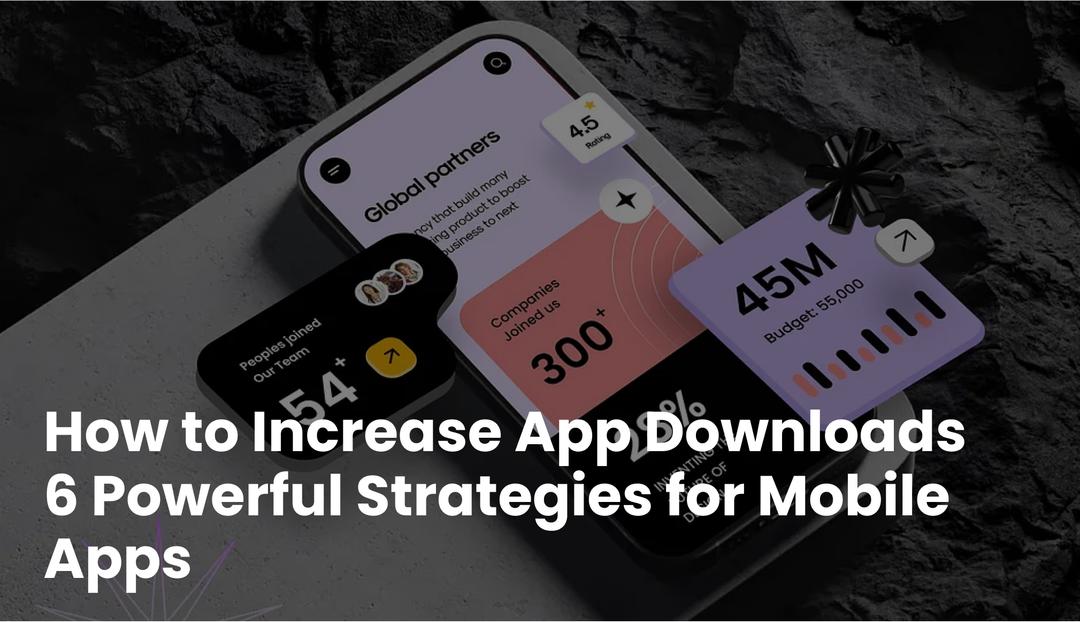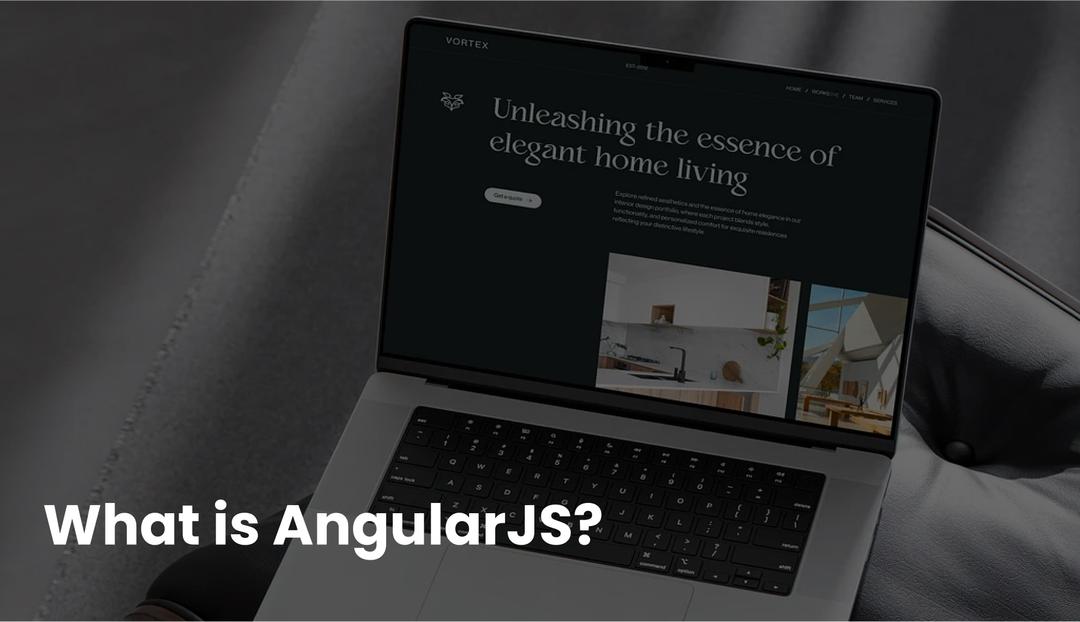In this blog, we’ll explore different types of medical apps available today, along with their benefits and potential drawbacks. We’ll also discuss key usability principles that enhance user experience and highlight the emerging trends shaping the future of digital health. To top it off, we will present the top 10 must-have medical apps for patients in 2025.
So without further ado, let’s get started!
What Are Medical Apps for Patients?
Medical apps are purpose-built to help patients manage their health effectively. These apps handle routine, repetitive tasks like scheduling appointments, keeping electronic health records, tracking vital signs, and providing custom-made fitness plans.
Key features include:
- Personal health tracking: Monitor heart rate, blood pressure, and glucose levels.
- Medication reminders: Keep track of medication schedules.
- Telemedicine: Connect with doctors for remote consultations.
- Health education: Access information on various health topics.
If you’re wondering how much it would cost to create an app, check out our detailed guide on app development costs.
Create the Perfect Health Companion for Your Patients!
Get a personalized demo today and see how we can help you deliver exceptional healthcare through cutting-edge technology.
Hire Expert
Types of Healthcare Mobile Apps
Healthcare mobile apps can be categorized into the following five major categories:
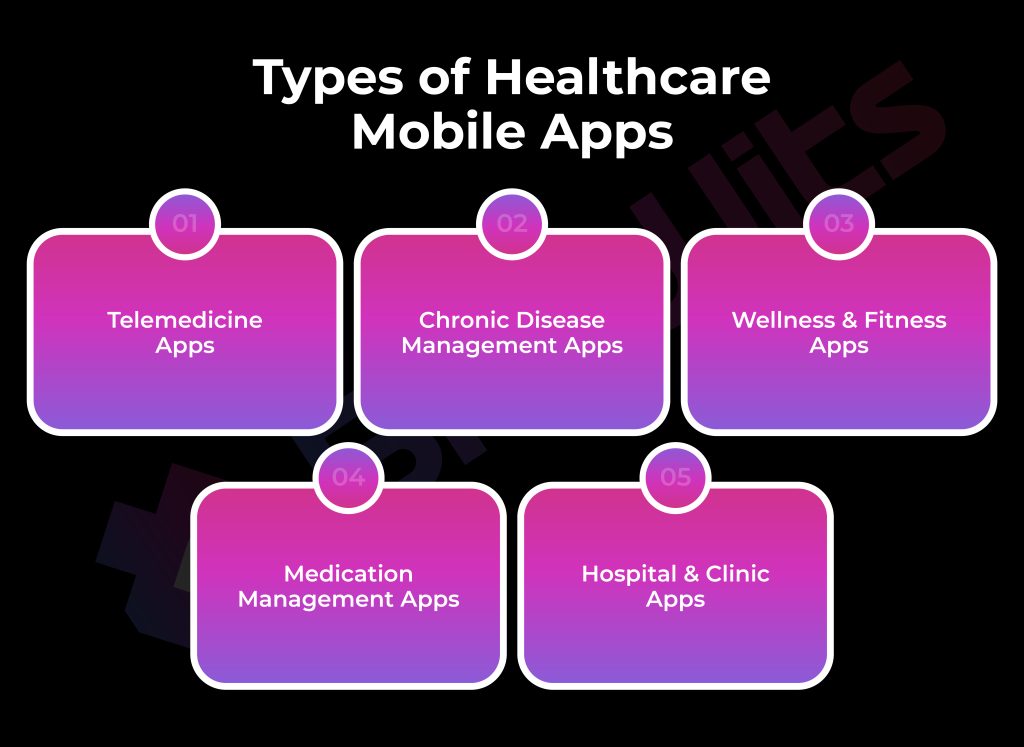
1. Telemedicine Apps
Telemedicine apps facilitate virtual consultations and allow patients to connect with healthcare providers remotely. To build such feature-rich apps, choosing the right mobile app development framework is essential. Frameworks like React Native, Flutter, and Xamarin are commonly used to ensure cross-platform compatibility, high performance, and seamless integration with healthcare systems.
Use Cases
- Routine Consultations: Patients with non-emergency health concerns, such as colds, allergies, or minor infections, can receive medical advice and prescriptions through telemedicine apps, reducing the burden on healthcare facilities.
- Specialist Access: Patients in rural or underserved areas can access specialist care without traveling long distances. Telemedicine apps enable consultations with cardiologists, dermatologists, and other specialists, ensuring timely diagnosis and treatment.
- Mental Health Support: Telemedicine apps provide a confidential and convenient platform for therapy sessions, counseling, and psychiatric consultations, making mental health support more accessible to those who need it.
- Post-Surgery Follow-Up: Patients recovering from surgery can use telemedicine apps for follow-up consultations, allowing healthcare providers to monitor progress and address concerns without requiring the patient to visit the clinic physically.
2. Chronic Disease Management Apps
Chronic disease management apps are tailored for patients with long-term conditions such as diabetes, hypertension, asthma, and heart disease. These apps provide tools for monitoring vital health metrics, managing medication, and accessing educational resources.
Use Cases
- Diabetes Management: Apps for diabetes patients offer features like blood glucose tracking, insulin dosage reminders, dietary recommendations, and integration with wearable devices to provide a comprehensive view of the patient’s health.
- Cardiac Health Monitoring: Patients with heart disease can use these apps to track their heart rate, blood pressure, and cholesterol levels. The apps can alert patients to potential issues, prompting them to seek medical attention if necessary.
- Asthma Control: Asthma management apps help patients track their symptoms, medication use, and peak flow readings. They can also provide air quality alerts, enabling patients to avoid environments that may trigger asthma attacks.
- Hypertension Management: Such apps are designed for regular patients to monitor their blood pressure regularly and track patterns and adaptations. They can also remind patients to take their medications and maintain a healthy lifestyle to manage their condition effectively.
3. Wellness & Fitness Apps
Wellness and fitness apps focus on preventive care by encouraging healthy habits, physical activity, and mental well-being. These apps aim to reduce the risk of chronic diseases and enhance overall health.
Use Cases
- Activity Tracking: Fitness apps use sensors in smartphones or wearable devices to track steps, distance, calories burned, and active minutes. They motivate users to meet daily activity goals, promoting a more active lifestyle.
- Diet and Nutrition: Wellness apps offer meal planning, calorie tracking, and nutritional advice, helping users make informed dietary choices that align with their health goals. Some apps can also cater to specific dietary needs, such as gluten-free or vegetarian diets.
- Mental Health and Relaxation: Apps focusing on mental health provide guided meditation sessions, breathing exercises, and stress management techniques. They help users manage anxiety, improve sleep quality, and maintain a positive mindset.
- Personalized Fitness Plans: Fitness apps can create customized workout plans based on the user’s fitness level, goals, and preferences. They provide video demonstrations and instructions to ensure proper exercise techniques, reducing the risk of injury.
4. Medication Management Apps
Medication management apps are designed to help patients adhere to their prescribed medication schedules, minimize the risk of missed doses, and provide information about drug interactions.
Use Cases
- Medication Reminders: These apps send notifications to remind patients when to take their medication, ensuring adherence to prescribed schedules. They can also track medication intake and provide reports that patients can share with their healthcare providers.
- Refill Alerts: Patients can set up alerts to remind them when their medication supply is running low, helping them avoid missed doses due to a lack of medication.
- Drug Interaction Warnings: Medication management apps can provide information about potential drug interactions, allowing patients to consult with their healthcare providers before taking new medications. This feature is crucial for patients taking multiple medications for chronic conditions.
- Health Condition Monitoring: By tracking symptoms and medication effectiveness, these apps enable patients and healthcare providers to make informed decisions about treatment adjustments, ensuring optimal care.
5. Hospital & Clinic Apps
Hospital and clinic apps are designed to improve the patient experience by providing easy access to healthcare services and information. They serve as a digital gateway to healthcare facilities, offering features that enhance convenience and efficiency.
Use Cases
- Appointment Scheduling: Patients can use hospital apps to book appointments with healthcare providers, check availability, and receive reminders. This reduces wait times and streamlines the appointment process.
- Patient Portals: These apps provide access to patient portals, where individuals can view their medical records, test results, and treatment history. This transparency empowers patients to be more involved in their healthcare.
- Real-Time Updates: Hospital apps can provide real-time updates on test results, treatment plans, and hospital discharge instructions. This ensures that patients and their families are always informed about their health status and care.
- Billing & Payments: Patients can use these apps to pay medical bills, view insurance coverage, and manage payment plans. This simplifies the financial aspect of healthcare, reducing stress and confusion.
Learn how mobile application development services can streamline the process of creating hospital and clinic apps for improved patient care.
Most In-Demand Patient Engagement Medical Apps
Certain types of healthcare apps have gained significant traction due to their direct impact on patient engagement:
The surge in patient engagement medical apps has reshaped patient care and self help activities, with more proactive and personalized care being provided with the help of emerging tech.
Certain types of apps have emerged as particularly impactful due to their ability to meet pressing healthcare needs, provide critical support, and enhance the overall patient experience. Below, we explore some of the most in-demand medical app types, along with why they are widely used, who uses them, and how they are making a difference.
1. Remote Patient Monitoring Apps
Why They’re in Demand: Remote Patient Monitoring (RPM) apps have become indispensable tools in managing patient care, particularly for those with chronic illnesses or conditions that require regular monitoring.
Remote Patient Monitoring apps allow healthcare providers to keep track of patients’ health data remotely, reducing the need for frequent hospital visits and ensuring timely intervention when necessary.
Demographics: RPM apps are predominantly used by elderly patients and those with chronic conditions like heart disease, diabetes, and respiratory disorders. Such apps are also popular among post-operative patients who require close monitoring during recovery. Caregivers and family members often use these apps to stay informed about their loved ones’ health status.
Benefits and Use Cases:
- Chronic Disease Management: Patients with chronic conditions can use RPM apps to regularly monitor vital signs such as blood pressure, glucose levels, heart rate, and oxygen saturation. Chronic disease management apps transmit data directly to healthcare providers to enable early detection of abnormalities and reduce the risk of complications.
- Post-Surgery Monitoring: Post-operative patients can use RPM apps to track recovery metrics like wound healing, pain levels, and mobility. Surgeons and healthcare teams can monitor progress remotely, reducing the need for in-person follow-ups unless necessary.
- Elderly Care: Elderly patients, especially those living alone, deeply benefit from RPM apps that monitor their health conditions and alert healthcare providers in case of emergencies. Elderly care apps can track falls, detect irregular heartbeats, and monitor sleep patterns – contributing to better care and safety of elderly patients.
- Chronic Obstructive Pulmonary Disease (COPD) Management: RPM apps help COPD patients by monitoring respiratory rate and oxygen levels. These apps are designed to help healthcare providers adjust treatment plans in real time and prevent exacerbations.
Build an App That Makes Your Practice Simple
Make it easier for your patients to connect, track their health, and access care. Start building your custom app today!
Hire Expert
2. Mental Health Apps: Addressing the Silent Crisis
Why They’re in Demand: With growing awareness of mental health issues and the stigma associated with seeking help, mental health apps offer a convenient, private, and accessible solution.
Mental health apps provide users with tools and resources to manage different aspects of their mental health, ranging from mood tracking and mindfulness exercises to virtual therapy sessions and more.
Demographics: Mental health apps are popular among a wide range of users, including teenagers, adults, and elderly individuals facing anxiety, depression, stress, and other mental health challenges. These apps are also frequently used by individuals who prefer digital interaction over in-person therapy, as well as those with busy schedules or limited access to mental health services.
Benefits and Use Cases:
- Cognitive Behavioral Therapy (CBT) Tools: Many mental health apps incorporate CBT techniques, providing exercises that help users identify and change negative thought patterns. This self-guided approach can be highly effective for managing conditions like anxiety and depression.
- Mindfulness and Meditation: Apps offering guided meditation and mindfulness practices help users manage stress and improve emotional well-being. Regular use of these features can lead to reduced anxiety levels, better sleep quality, and enhanced focus.
- Mood and Sleep Tracking: Users can track their mood patterns and sleep quality over time, gaining insights into how lifestyle factors affect their mental health. This data can be shared with therapists or healthcare providers to inform treatment decisions.
- Crisis Support: Some apps provide immediate access to crisis support, including hotlines and chat features, ensuring that users have a lifeline during critical moments.
3. Chronic Care Management Apps
Why They’re in Demand: Chronic care management apps cater to patients with long-term conditions that require ongoing care and monitoring. These apps provide personalized insights, reminders, and support to help patients manage their health effectively, improving their quality of life and reducing healthcare costs.
Demographics: chronic care management apps are mainly used by individuals with chronic conditions such as diabetes, hypertension, arthritis, and kidney disease. These apps are also valuable tools for caregivers who assist in managing these conditions, as well as healthcare providers who need to monitor patient adherence to treatment plans.
Benefits and Use Cases:
- Diabetes Management: Apps tailored for diabetes patients offer features like blood glucose monitoring, diet and exercise tracking, and insulin dose calculations. They can integrate with glucose meters and wearable devices to provide real-time data and insights.
- Hypertension Control: Patients with high blood pressure can use chronic care apps to monitor their readings, receive medication reminders, and access lifestyle tips to manage their condition. These apps help users maintain target blood pressure levels, reducing the risk of heart disease and stroke.
- Arthritis Management: Apps designed for arthritis patients offer tools for pain tracking, exercise recommendations, and medication reminders. They provide educational resources on managing joint pain and improving mobility.
- Kidney Disease Monitoring: Chronic care apps for kidney disease patients help monitor vital signs, fluid intake, and medication adherence. They can also alert healthcare providers to potential issues, ensuring timely adjustments to treatment plans.
4. Medication Adherence Apps
Why They’re in Demand: Medication adherence is a critical aspect of effective healthcare, yet many patients struggle to take their medications as prescribed. Medication adherence apps offer solutions to this challenge, providing reminders, tracking, and educational resources to ensure patients stay on track with their treatment regimens.
Demographics: These apps are widely used by patients with complex medication schedules, including those with chronic illnesses, elderly individuals, and patients managing multiple conditions. They are also popular among caregivers who need to manage medication for family members.
Benefits and Use Cases:
- Customizable Reminders: Medication adherence apps allow users to set personalized reminders for each medication, including dosage, frequency, and timing. This helps prevent missed doses and overdosing.
- Medication Tracking: Users can log each dose taken, providing a record that can be shared with healthcare providers. This feature helps track adherence and identify potential issues with medication management.
- Refill Alerts: Apps can notify patients when their medication supply is running low, ensuring timely refills and preventing gaps in treatment.
- Drug Interaction Warnings: Some apps provide information on potential drug interactions, helping users avoid harmful combinations and consult healthcare providers when necessary.
5. Health and Wellness Coaching Apps
Why They’re in Demand: Health and wellness coaching apps provide personalized guidance and support for individuals looking to improve their overall health. These apps offer tailored plans, real-time feedback, and motivational tools, making them popular among users seeking to adopt healthier lifestyles.
Demographics: These apps are commonly used by individuals who are health-conscious and proactive about maintaining their well-being. They attract a broad audience, including young adults, middle-aged individuals, and those seeking to prevent or manage lifestyle-related conditions.
Benefits and Use Cases:
- Personalized Health Plans: Health coaching apps create individualized plans based on user data, health goals, and preferences. These plans may include dietary recommendations, exercise routines, and stress management techniques.
- Behavioral Change Support: Such apps help users make sustainable lifestyle changes that lead to improved health outcomes By offering daily tips, motivational messages, and progress tracking,
- Integration with Wearables: Health coaching apps often integrate with wearable devices, providing real-time feedback on activity levels, sleep patterns, and other health metrics. This integration allows for more accurate tracking and personalized recommendations.
- Preventive Health: These apps emphasize preventive care and help users adopt habits that reduce the risk of chronic diseases, obesity, and other health issues. They focus on holistic well-being, including everything from physical, mental, and emotional health.
Your Digital Healthcare Transformation Starts Here
Hire developers from BitsWits and take your healthcare services online with a tailor-made app. From telemedicine to patient tracking, we build apps that meet your exact needs.
Hire Expert
Benefits of Healthcare & Medical Apps
Mobile healthcare and medical apps offer numerous advantages that actually transforms how care is delivered and experienced today.
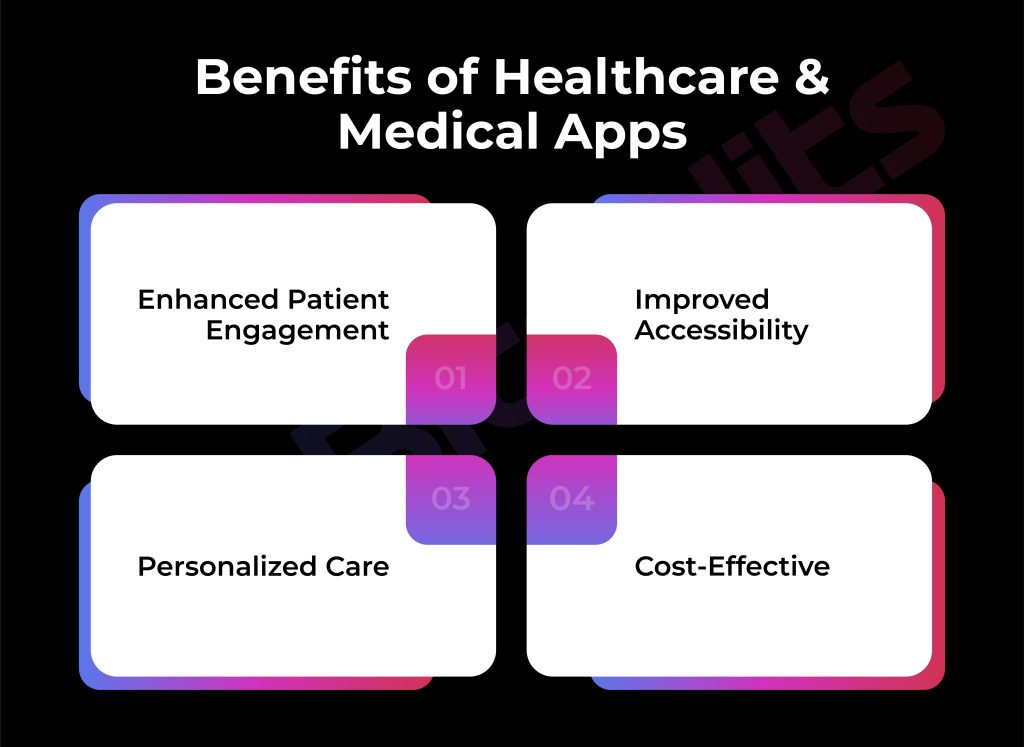
- Enhanced Patient Engagement: By giving patients access to their health data and educational resources, these apps encourage active participation in their health management.
- Improved Accessibility: Patients can connect with healthcare providers from anywhere, breaking down geographical barriers and reducing the need for travel.
- Personalized Care: Apps provide tailored health insights and recommendations based on individual patient data, leading to more effective treatments.
- Cost-Effective: Reducing the frequency of in-person visits and hospital readmissions can lead to significant cost savings for both patients and healthcare providers.
Shortcomings in Healthcare & Medical Mobile Apps
While the benefits are clear, mobile healthcare and medical apps also present several challenges and concerns that must be addressed.
- Data Security and Privacy: With sensitive health data being shared and stored, robust security measures are paramount to protect against breaches and unauthorized access.
- Regulatory Compliance: Healthcare apps must adhere to stringent regulations like HIPAA (Health Insurance Portability and Accountability Act), which can be complex and costly.
- User Adoption and Engagement: Making patients not only download but consistently use these apps is a challenge, requiring intuitive design and clear value demonstration.
- Integration with Healthcare Systems: Seamless integration with existing electronic health records (EHR) systems is crucial for comprehensive care but can be technically challenging.
Core Usability Principles for Healthcare Apps
Healthcare apps have become a crucial part of patient care today, with groundbreaking services like health monitoring, medication management, and virtual consultations becoming easily accessible using a smartphone.
However, the effectiveness of healthcare apps still largely depends on how user-friendly they are. That’s where core usability principles come into play – to meet the needs of all users, from tech-savvy individuals to older adults with limited digital literacy.
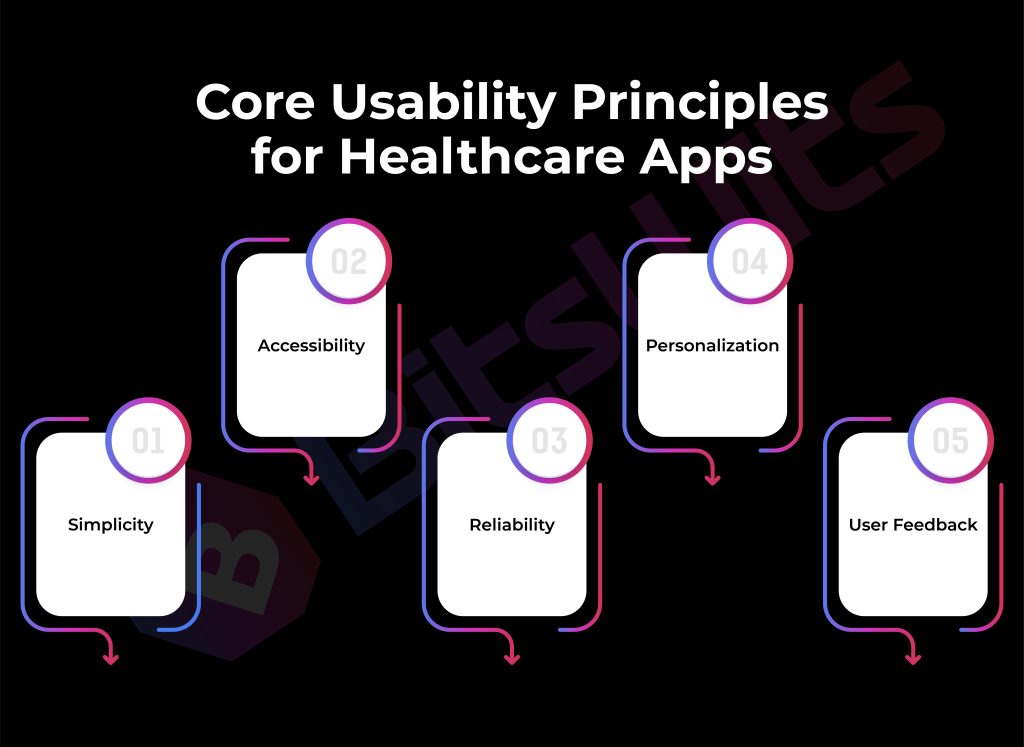
1. Simplicity
A healthcare app’s primary goal should be to make navigation straightforward and hassle-free. Users should be able to find what they need without confusion, which means avoiding cluttered interfaces and unnecessary features.
- Minimalistic Design: The app should feature a clean layout with easy-to-read fonts, clear icons, and a logical flow. Reducing the number of steps needed to complete a task (like scheduling an appointment or checking lab results) minimizes user frustration.
- Straightforward Navigation: Menus should be simple, with clear labels that guide users to the necessary functions. Important actions, like emergency contact buttons or medication reminders, should be prominently placed for quick access.
- Consistent Interface: Consistency in design elements, such as colors, buttons, and fonts, helps users understand how to interact with the app. Familiar patterns and design cues enhance the user experience by reducing the learning curve.
2. Accessibility
Healthcare apps must be accessible to everyone, including those with disabilities or impairments. Designing with accessibility in mind is the key so that the app can be used by a broader audience and provide equitable healthcare solutions.
- Voice Commands & Speech Recognition: Implementing voice commands can assist users with visual impairments or mobility issues, enabling them to interact with the app hands-free. Voice search capabilities also help streamline navigation and make it easier for users to find information quickly.
- Support for Screen Readers: Compatibility with screen readers and other assistive technologies is paramount for users with visual impairments. This includes providing alternative text for images and ensuring that all interactive elements are accessible via keyboard shortcuts.
- High Contrast and Large Text Options: Offering high-contrast color schemes and adjustable text sizes can help users with low vision. Large buttons and clear visual indicators make it easier for users to interact with the app, reducing the likelihood of mistakes.
- Localization and Language Options: Healthcare apps should support multiple languages and regional settings to reach a diverse user base.
3. Reliability
For healthcare apps, reliability is non-negotiable. Users must be able to trust that the app will function correctly and consistently, especially when handling sensitive health information.
- Testing & QA: Testing and quality assurance during development helps identify and eliminate bugs before the app is released. Testing under different conditions, such as low internet connectivity or varying device types helps the app perform well in real-world scenarios.
- Data Security & Privacy: Healthcare apps must comply with strict data protection regulations, such as HIPAA in the United States, to protect user privacy. Implementing strong encryption, secure authentication methods, and regular security updates are critical for maintaining user trust.
- Offline Functionality: Offline accessibility helps users access important information and features even when they don’t have an internet connection. This is particularly useful for remote areas or in situations with unreliable connectivity.
4. Personalization
Personalization is a powerful tool for user engagement and satisfaction. Healthcare apps can cater to individual preferences and make the app more relevant and useful with customization features.
- Customizable Dashboards: Users should be able to personalize their home screens to display the information most relevant to them, such as medication reminders, upcoming appointments, or daily health tips. This helps create a more focused and user-centric experience.
- Personal Health Insights: Apps that provide personalized health insights based on user data (like activity levels, sleep patterns, or diet) offer more value. Analyzing these datasets, the app can offer tailored recommendations that promote healthier behaviors and lifestyle choices.
- Notification Preferences: Allowing users to set their notification preferences helps prevent alert fatigue. Users should be able to choose which notifications they want to receive and how often, ensuring that reminders and alerts are helpful rather than intrusive.
5. User Feedback
A successful healthcare app continuously evolves based on user feedback. Actively seeking input from users helps developers identify areas for improvement and make necessary adjustments for usability enhancement.
- In-App Feedback Tools: Including features that allow users to provide feedback directly within the app can capture insights about their experiences. Surveys, rating systems, and comment sections help gather valuable information about what works well and what needs improvement.
- Usability Testing: Conducting usability tests with real users during the development phase can reveal potential issues and usability challenges. By observing how users interact with the app, developers can make data-driven decisions to improve the design and functionality.
- Community Support & Interaction: Creating forums or support communities within the app allows users to share their experiences, ask questions, and provide suggestions. This sense of community can enhance user satisfaction and provide developers with ongoing feedback.
Take the Next Step in Healthcare with a Digital Solution
Give your patients the tools they need to manage their health. Start developing your healthcare app today and see how digital solutions can improve patient care.
Hire Expert
10 Best Medical Apps for Patients in 2025
Some remarkable healthcare and medical apps have set benchmarks in the healthcare industry for their functionality and impact on patient engagement. Here’s our curated list of the top 10 healthcare apps for patients in 2025:
1. Calm
- Year Founded: 2012
- Tech Stack: Ruby on Rails, Node.js, and AI-based personalized recommendation algorithms.
- Demographics: General population focusing on mental wellness.
- Downloads: Over 100 million.
- Monetization Model: Freemium with in-app purchases and subscription plans.
- What Makes it Great: Calm provides guided meditation sessions, sleep stories, and mindfulness exercises. Its user-friendly design and focus on mental health make it widely popular. Addressing the most pressing issues like stress, anxiety, and sleep disorders, Calm plays a vital role in preventive healthcare and mental wellness.
2. Headspace
- Year Founded: 2010
- Tech Stack: Python for backend, React Native for cross-platform functionality.
- Demographics: General public, including corporate wellness programs.
- Downloads: Over 70 million.
- Monetization Model: Freemium with subscription-based premium content.
- What Makes it Great: Headspace is a leading mindfulness and meditation app that offers guided sessions to improve mental well-being. Its science-backed techniques and easy-to-use interface make it an essential tool for managing stress and fostering a healthy lifestyle.
3. Teladoc Health
- Year Founded: 2002
- Tech Stack: Cloud-based infrastructure to support scalability.
- Demographics: Broad, from individuals to corporate clients, focusing on telehealth.
- Downloads: Over 10 million.
- Monetization Model: Subscription and fee-per-consultation.
- What Makes it Great: Teladoc provides virtual healthcare consultations, making it a key player in the telemedicine industry. It allows users to connect with doctors for primary care, mental health support, and specialist consultations, making healthcare more accessible, especially in underserved areas.
4. Ada Health
- Year Founded: 2011
- Tech Stack: AI and machine learning for personalized health assessments.
- Demographics: General population seeking initial health guidance.
- Downloads: Over 10 million.
- Monetization Model: Freemium model with premium features for healthcare providers.
- What Makes it Great: Ada Health utilizes AI to help users understand symptoms and potential health issues. It offers a simple, conversational interface, making it easy for users to navigate their healthcare concerns and seek appropriate medical attention.
5. MySugr
- Year Founded: 2012
- Tech Stack: API integrations with blood glucose monitoring devices and health data analytics.
- Demographics: Diabetic patients.
- Downloads: Over 3 million.
- Monetization Model: Freemium with premium features available for purchase.
- What Makes it Great: MySugr simplifies diabetes management by allowing users to track blood sugar levels, set reminders, and get personalized insights. The app’s engaging interface and supportive features help users maintain control over their diabetes.
6. Kaia Health
- Year Founded: 2016
- Tech Stack: AI-powered motion analysis for physical therapy exercises.
- Demographics: Individuals with chronic pain or musculoskeletal disorders.
- Downloads: Over 1 million.
- Monetization Model: Subscription-based, often integrated with health insurance plans.
- What Makes it Great: Kaia Health provides a digital platform for physical therapy, offering personalized exercise routines and real-time feedback. It empowers patients to manage chronic pain effectively without needing frequent in-person therapy sessions.
7. Livongo
- Year Founded: 2014
- Tech Stack: Data analytics and machine learning to provide personalized health insights.
- Demographics: Patients with chronic conditions like diabetes and hypertension.
- Downloads: Over 1 million.
- Monetization Model: Subscription-based, often covered by employers and health plans.
- What Makes it Great: Livongo integrates smart devices, health tracking, and data analytics to help users manage chronic conditions. It provides personalized insights and coaching, reducing the need for hospital visits and empowering patients to manage their health effectively.
8. HealthifyMe
- Year Founded: 2012
- Tech Stack: Uses AI and machine learning for personalized diet and fitness plans.
- Demographics: General population, focusing on fitness and weight loss.
- Downloads: Over 10 million.
- Monetization Model: Freemium with subscription plans for premium features.
- What Makes it Great: HealthifyMe combines calorie tracking, diet planning, and fitness guidance into one app. It also includes AI-based nutritionists that provide users with personalized health and fitness advice, making it easier for users to stay healthy and fit.
9. Fitbit
- Year Founded: 2007
- Tech Stack: Integrates with wearables, using data analytics for health monitoring.
- Demographics: Fitness enthusiasts, general health-conscious users.
- Downloads: Over 50 million.
- Monetization Model: Device sales, subscription services for premium content.
- What Makes it Great: Fitbit syncs with its wearable devices to track activity, sleep, and heart rate. Its comprehensive health metrics and easy integration with other health services make it a go-to app for fitness tracking and health monitoring.
10. Doctor on Demand
- Year Founded: 2012
- Tech Stack: Video conferencing technology integrated with patient health records.
- Demographics: General population seeking convenient access to healthcare.
- Downloads: Over 1 million.
- Monetization Model: Fee-per-visit, covered by some insurance plans.
- What Makes it Great: Doctor on Demand provides on-demand video consultations with licensed healthcare professionals, including physicians, psychologists, and psychiatrists. It offers a convenient solution for those needing quick access to medical advice without visiting a doctor’s office, making healthcare more accessible and timely.
Your Healthcare App Starts Here
Develop an app that integrates telemedicine, tracking, and reminders. Contact us today to start building!
Hire Expert
Future Trends for Mobile Apps in Healthcare
The healthcare industry is driven by technology that is making patient care more accessible, personalized, and secure. Here are the key trends shaping the future of healthcare apps:
AI & Machine Learning
AI and Machine Learning are set to redefine how healthcare is delivered, focusing on precision and personalization. These technologies will enable apps to:
- Predict Health Issues: AI-powered apps can anticipate potential health problems by analyzing patterns in user data and allowing for early intervention. For example, apps could predict a diabetic patient’s risk of a blood sugar spike and suggest preventive measures.
- Tailor Treatment Plans: AI algorithms can provide personalized treatment recommendations based on individual health data, such as genetic information, lifestyle, and medical history for more effective care.
- Enhance Diagnosis Accuracy: Machine learning can assist in diagnosing conditions by analyzing medical images or recognizing symptoms from user input, reducing diagnostic errors and providing timely treatment.
If you’re looking to integrate AI and machine learning into your healthcare app, consider working with an expert AI development company that specializes in building advanced solutions for the healthcare industry.
Wearable Integration
The future of healthcare apps is increasingly tied to wearable technology, making real-time health monitoring more prevalent and practical. Apps integrated with wearables will:
- Track Vital Signs: Devices like smartwatches can continuously monitor heart rate, oxygen levels, and sleep patterns, providing real-time health data.
- Provide Immediate Feedback: Users can receive instant alerts about potential health issues, such as abnormal heart rhythms or sleep apnea, prompting them to take immediate action.
- Facilitate Remote Monitoring: Wearable integration allows healthcare providers to monitor patients remotely, especially those with chronic conditions without frequent hospital visits.
Blockchain for Data Security
As the use of mobile health apps grows, so do concerns about data security and patient privacy. Blockchain technology is a gamechanger, as it allows:
- Securing Patient Data: Blockchain can create decentralized and tamper-proof records of patient data to make sure that sensitive information is safe from unauthorized access and cyber threats.
- Ensuring Data Integrity: Healthcare apps can guarantee the integrity and authenticity of patient records, making sure that data is accurate and unaltered with the help of blockchain.
- Facilitating Data Sharing: Blockchain enables secure and transparent data sharing among healthcare providers – improving collaboration while maintaining patient confidentiality.
Expansion of Telehealth Services
Telehealth has become a cornerstone of modern healthcare, and its expansion via mobile apps is set to continue. Future developments will include:
- Diverse Specializations: Beyond general consultations, telehealth apps will increasingly offer access to specialized care, including mental health support, dermatology, cardiology, and more.
- Improved Accessibility: Telehealth apps will enhance access to healthcare for people in remote or underserved areas, bridging the gap between patients and specialists.
- Enhanced User Experience: With advancements in technology, telehealth services will provide smoother, more reliable video consultations, better integration with electronic health records, and more intuitive user interfaces.
Advanced Data Analytics
Data analytics is becoming a critical component of healthcare apps in delivering real-time insights that can lead to better health outcomes. Key advancements will include:
- Predictive Analytics: Apps will use data analytics to predict health trends, such as outbreaks of infectious diseases or population health risks, enabling proactive measures.
- Personal Health Insights: Apps can offer tailored health advice, track progress towards health goals, and recommend lifestyle changes.
- Operational Efficiency: Healthcare providers can use analytics to optimize resource allocation, reduce waiting times, and improve overall service quality.
AR & VR
AR and VR technologies will add new dimensions to patient care, making healthcare apps more interactive and effective. Potential applications include:
- Patient Education: AR apps can provide 3D visualizations of the human body, helping patients understand their conditions and treatments better.
- Therapeutic Use: VR can be used for pain management, physical therapy, and mental health treatments, offering immersive environments that aid in recovery.
- Training and Simulation: Healthcare professionals can use AR and VR for realistic training simulations, improving skills and readiness for real-world medical situations.
Build a Smarter Healthcare Solution
Leverage technology to provide better care with a healthcare app that connects patients and providers. Contact us to begin developing a user-friendly, secure app.
Hire Expert
Conclusion
The healthcare industry has become a hotbed of innovation, with technology being the driving force behind it. While American adults use healthcare apps for diagnostic and chronic health management purposes, young adults and teenagers can also be seen using fitness and therapy apps to live a healthy life.
The trend of wearables is contributing the most towards the adoption of a healthier lifestyle, while fitness influencers and and popular YouTubers are now promoting fitness and therapy apps. With AI and VR now entering the race, we are gonna see surprising advancements in the healthcare industry for sure.
As a leading healthcare app development company, BitsWits builds solutions that prioritize user engagement, security, and ease of use. Our apps seamlessly integrate advanced technologies, providing tools for chronic care, diagnostics, and fitness that bring impactful health improvements within reach.
FAQs







